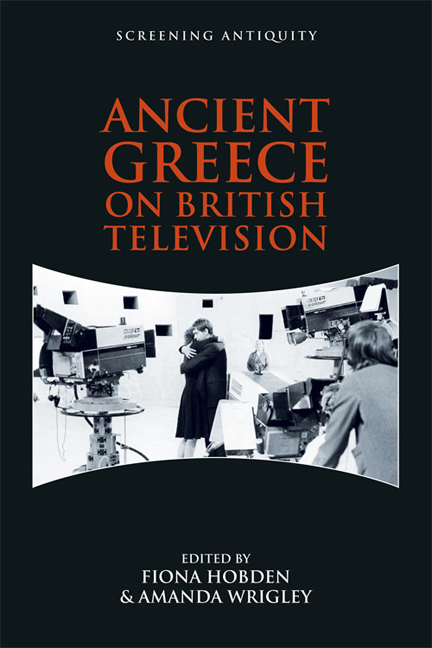Book contents
- Frontmatter
- Contents
- List of Figures and Tables
- Series Editors’ Preface
- Acknowledgements
- Contributors
- Abbreviations
- Broadcasting Greece: An Introduction to Greek Antiquity on the Small Screen
- 1 Are We the Greeks? Understanding Antiquity and Ourselves in Television Documentaries
- 2 Louis MacNeice and ‘The Paragons of Hellas’: Ancient Greece as Radio Propaganda
- 3 The Beginnings of Civilisation: Television Travels to Greece with Mortimer Wheeler and Compton Mackenzie
- 4 Tragedy for Teens: Ancient Greek Tragedy on BBC and ITV Schools Television in the 1960s
- 5 The Serpent Son (1979): A Science Fiction Aesthetic?
- 6 Don Taylor, the ‘Old-Fashioned Populist’? The Theban Plays (1986) and Iphigenia at Aulis (1990): Production Choices and Audience Responses
- 7 The Odyssey in the ‘Broom Cupboard’: Ulysses 31 and Odysseus: The Greatest Hero of Them All on Children’s BBC, 1985–1986
- 8 Greek Myth in the Whoniverse
- 9 The Digital Aesthetic in ‘Atlantis: The Evidence’ (2010)
- 10 Greece in the Making: From Intention to Practicalities in Television Documentaries. A Conversation with Michael Scott and David Wilson
- Bibliography
- Index
4 - Tragedy for Teens: Ancient Greek Tragedy on BBC and ITV Schools Television in the 1960s
Published online by Cambridge University Press: 24 April 2021
- Frontmatter
- Contents
- List of Figures and Tables
- Series Editors’ Preface
- Acknowledgements
- Contributors
- Abbreviations
- Broadcasting Greece: An Introduction to Greek Antiquity on the Small Screen
- 1 Are We the Greeks? Understanding Antiquity and Ourselves in Television Documentaries
- 2 Louis MacNeice and ‘The Paragons of Hellas’: Ancient Greece as Radio Propaganda
- 3 The Beginnings of Civilisation: Television Travels to Greece with Mortimer Wheeler and Compton Mackenzie
- 4 Tragedy for Teens: Ancient Greek Tragedy on BBC and ITV Schools Television in the 1960s
- 5 The Serpent Son (1979): A Science Fiction Aesthetic?
- 6 Don Taylor, the ‘Old-Fashioned Populist’? The Theban Plays (1986) and Iphigenia at Aulis (1990): Production Choices and Audience Responses
- 7 The Odyssey in the ‘Broom Cupboard’: Ulysses 31 and Odysseus: The Greatest Hero of Them All on Children’s BBC, 1985–1986
- 8 Greek Myth in the Whoniverse
- 9 The Digital Aesthetic in ‘Atlantis: The Evidence’ (2010)
- 10 Greece in the Making: From Intention to Practicalities in Television Documentaries. A Conversation with Michael Scott and David Wilson
- Bibliography
- Index
Summary
From the inception of schools television in late 1950s Britain, programmes produced by both the BBC and independent companies such as Associated-Rediffusion and Grampian brought the experience of theatre plays in performance to thousands of teenage school pupils across Britain, as well as a ‘great army of eavesdroppers’, as the Radio Times described individuals tuning in to schools programming within the home. The pedagogic motivation behind these programmes frames the terms of television's engagement with works from the theatre, with both play and performance often contextualised in a number of ways. For example, introductory programmes and talks were variously used as ways of offering background on content, genre, context and conventions (to ‘put the class in a better position to receive what they are to see’); narrator figures were sometimes used to facilitate engagement; and almost all series were accompanied by the publication of illustrated pamphlets for pupils and leaflets for teachers, both of which provided background information and guides for further teaching and learning activities. Schools television series were intended to supplement, not supplant, the school curriculum and traditional teaching methods, but some series had a close relationship with core elements of the school curriculum (such as mathematics) whilst others (such as drama) were decidedly ‘off-syllabus’. Writing in 1966, the BBC's Controller of Educational Broadcasting, Richmond Postgate, stated that the very few ‘preconceived ideas’ behind the commission of BBC television series for schools included one that they should offer ‘something that [pupils] would not otherwise get at all, or not so well’. Indeed, regarding dramatic performance, ‘the evidence seemed to be that television had a distinctive role to play in bringing the theatre to the classroom; in giving children an opportunity to see plays of quality performed’. Given general indications in the archival evidence on the demographic diversity of pupils who were watching drama series, and the School Broadcasting Council's finding that ‘off-syllabus’ programmes were more likely to be shown to schoolchildren in non-examination streams, it is reasonable to consider that for a substantial proportion of the audience these television programmes would have offered a rare opportunity to engage with theatre works on either the page or the stage.
- Type
- Chapter
- Information
- Ancient Greece on British Television , pp. 84 - 108Publisher: Edinburgh University PressPrint publication year: 2018



